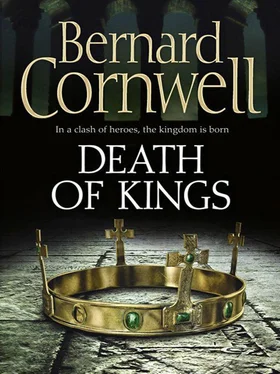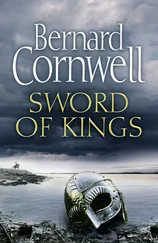Æthelflaed wanted to pray in the nuns’ chapel, and I left her in Saint Hedda’s and walked through the silent streets to the palace where I surrendered my sword at the gatehouse and saw Steapa sitting alone in the outer courtyard. His grim, skin-stretched face that had terrified so many of Alfred’s enemies was wet with tears. I sat on the bench beside him, but said nothing. A woman hurried past carrying a stack of folded linens. The king dies, yet still sheets must be washed, rooms swept, ashes thrown out, wood stacked, grain milled. A score of horses had been saddled and were waiting at the courtyard’s farther end. I supposed they were for messengers who would carry the news of the king’s death to every corner of his kingdom, but instead a troop of men, all in mail and all helmeted, appeared from a doorway and were helped up into their saddles. ‘Your men?’ I asked Steapa.
He gave them a sour glance. ‘Not mine.’
They were Æthelwold’s men. Æthelwold himself was the last to appear and, like his followers, he was dressed for war in a helmet and mail. Three servants had brought the troops’ swords from the gatehouse and men milled about in search of their own blade, then strapped the swords and belts about their waists. Æthelwold took his own long-sword, let a servant buckle the belt, then was helped up onto his horse, a big black stallion. He saw me then. He kicked the horse towards me and pulled the blade out of its scabbard. I did not move, and he curbed the stallion a few paces away. The horse flailed a hoof at the cobblestones, striking a spark. ‘A sad day, Lord Uhtred,’ Æthelwold said. The bare sword was at his side, pointing down. He wanted to use it and he dared not use it. He had ambition and he was weak.
I looked up into his long face, once so handsome, now ravaged by drink and anger and disappointment. There was grey at his temples. ‘A sad day, my prince,’ I agreed.
He was measuring me, measuring the distance his sword needed to travel, measuring the chance he would have to escape through the gate arch after striking the blow. He glanced around the courtyard to see how many of the royal bodyguard were in sight. There were only two. He could have struck me, let his followers take care of the two men, and be gone, all in a moment, but still he hesitated. One of his followers pushed his horse close. The man wore a helmet with closed cheek-plates, so all I could see of his face were his eyes. A shield was slung on his back and on it was painted the head of a bull with bloodied horns. His horse was nervous and he slapped its neck hard. I saw the scars on the beast’s flanks where he had used his spurs deep and hard. He leaned close to Æthelwold and said something under his breath, but was interrupted by Steapa, who simply stood up. He was a huge man, frighteningly tall and broad and, as commander of the royal bodyguard, permitted to wear his sword throughout the palace. He grasped his sword’s hilt and Æthelwold immediately pushed his own blade halfway back into its scabbard. ‘I was worried,’ he said, ‘that the damp weather would have rusted the sword. It seems not.’
‘You put fleece-grease on the blade?’ I asked.
‘My servant must,’ he said airily. He pushed the blade home. The man with the bloodied bull’s horns on his shield stared at me from the shadows of his helmet.
‘You’ll return for the funeral?’ I asked Æthelwold.
‘And for the coronation too,’ he said slyly, ‘but till then I have business at Tweoxnam.’ He offered me an unfriendly smile. ‘My estate there is not so large as yours at Fagranforda, Lord Uhtred, but large enough to need my attention in these sad days.’ He gathered the reins and rammed back his spurs so that the stallion leaped forward. His men followed, their horses’ hooves loud on the stone.
‘Who shows a bull’s head on his shield?’ I asked Steapa.
‘Sigebriht of Cent,’ Steapa said, watching the men disappear through the arch. ‘A young rich fool.’
‘Were they his followers? Or Æthelwold’s?’
‘Æthelwold has men,’ Steapa said. ‘He can afford them. He owns his father’s estates at Tweoxnam and Wimburnan, and that makes him wealthy.’
‘He should be dead.’
‘It’s family business,’ Steapa said, ‘nothing to do with you and me.’
‘It’s you and me who’ll be doing the killing for the family,’ I said.
‘I’m getting too old for it,’ he grumbled.
‘How old are you?’
‘No idea,’ he said, ‘forty?’
He led me through a small gate in the palace wall, then across a patch of waterlogged grass towards Alfred’s old church that stood beside the new minster. Scaffolding spider-webbed the sky where the great stone tower was unfinished. Townsfolk stood by the old church door. They did not speak, but stood and looked bereft, shuffling aside as Steapa and I approached. Some bowed. The door was guarded today by six of Steapa’s men, who pulled their spears aside when they saw us.
Steapa made the sign of the cross as we entered the old church. It was cold inside. The stone walls were painted with scenes from the Christian scriptures, while gold, silver and crystal glinted from the altars. A Dane’s dream, I thought, because there was enough treasure here to buy a fleet and fill it with swords. ‘He thought this church was too small,’ Steapa said in wonderment as he gazed up at the high roof beams. Birds flew there. ‘A falcon nested up there last year,’ he said.
The king had already been brought to the church and laid in front of the high altar. A harpist played and Brother John’s choir sang from the shadows. I wondered if my son was among them, but did not look. Priests muttered in front of side-altars or knelt beside the coffin where the king lay. Alfred’s eyes were closed and his face tied with a white cloth that compressed his lips between which I could just see a crust, presumably because a priest had placed a piece of the Christian’s holy bread in the dead man’s mouth. He was dressed in a penitent’s white robe, like the one he had once forced me to wear. That had been years before, when Æthelwold and I had been commanded to abase ourselves before an altar, and I had been given no choice but to agree, but Æthelwold had turned the whole miserable ceremony into farce. He had pretended to be full of remorse, and shouted that remorse to the sky, ‘No more tits, God! No more tits! Keep me from tits!’ and I remembered how Alfred had turned away in frustrated disgust.
‘Exanceaster,’ Steapa said.
‘You were remembering the same day,’ I said.
‘It was raining,’ he said, ‘and you had to crawl to the altar in the field. I remember.’
That had been the very first time I had seen Steapa, so baleful and frightening, and later we had fought and then become friends, and it was all such a long time ago, and I stood beside Alfred’s coffin and thought how life slipped by, and how, for nearly all my life, Alfred had been there like a great landmark. I had not liked him. I had struggled against him and for him, I had cursed him and thanked him, despised him and admired him. I hated his religion and its cold disapproving gaze, its malevolence that cloaked itself in pretended kindness, and its allegiance to a god who would drain the joy from the world by naming it sin, but Alfred’s religion had made him a good man and a good king.
And Alfred’s joyless soul had proved a rock against which the Danes had broken themselves. Time and again they had attacked, and time and again Alfred had out-thought them, and Wessex grew ever stronger and richer and all that was because of Alfred. We think of kings as privileged men who rule over us and have the freedom to make, break and flaunt the law, but Alfred was never above the law he loved to make. He saw his life as a duty to his god and to the people of Wessex and I have never seen a better king, and I doubt my sons, grandsons and their children’s children will ever see a better one. I never liked him, but I have never stopped admiring him. He was my king and all that I now have I owe to him. The food that I eat, the hall where I live and the swords of my men, all started with Alfred, who hated me at times, loved me at times, and was generous with me. He was a gold-giver.
Читать дальше
Конец ознакомительного отрывка
Купить книгу












